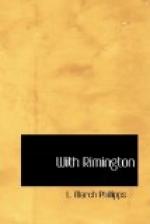Of the details of the attack, when it came to the last charge, we could see nothing. The Naval Brigade, who had the hardest part of the position to take, lost terribly, but did the job in a way that every one says was perfectly splendid. It is said, however, that they made the mistake, in the scaling of the hill, of closing together, and so offering a more compact mass to the enemy’s fire. We came on behind the infantry with our friends the Lancers, and passed through a gap in the range and on across some open ground and through a few more kopjes as fast as we could go. Then we came in sight of the enemy, and the same thing happened as at Belmont. A lot of horsemen, enough to have eaten us up, that were hanging about the rear of the Boer column, came wheeling out against us, and as we continued to approach, opened fire. Luckily there was good cover for our ponies behind some hillocks, and, leaving them there, we crawled out among the rocks and blazed at the Boers. But this was all we could do. We daren’t attack. The only hope was guns, and it was a long and inexplicable time before any guns came up. By that time the Boer column was almost across the plain, winding its way in among the kopjes on the farther side, but the 15-pounders made some very pretty practice at the rear-guard, and considerably hastened their movements. The Boer retreat seems to have been conducted with much coolness and method. They ceased firing their big guns while the attack was still a good way distant, and limbered up and sent them on, the riflemen remaining till the attack was close upon them, and firing their last shots right in our infantry’s faces, then rushing down to their horses and mounting and galloping off. No doubt, they exposed themselves a bit in doing this, but pumped and excited men can’t be expected to shoot very straight, and I’m afraid their losses were light compared to ours. They have now retired, we presume, to the next range of kopjes, there to smoke their pipes and read their Bibles and await our coming. I suppose we shall be along to-morrow or next day.
LETTER IV
MODDER RIVER
MODDER RIVER CAMP,
December 1, 1899.
We had a great old fight here two days ago, and suffered another crushing victory; but though I saw it all, I daresay you know more about the whole thing by this time than I do.
This is Modder River, deep and still, just beneath my feet. It is a lovely, cloudless morning, and going to be a very hot day. I am writing my letter on the banks of the river in the shade of green trees and shrubs, with birds singing and twittering, and building their nests round me; it is spring-time here, you know, or early summer. Here and there, sauntering or sitting, are groups of our khaki soldiers enjoying mightily a good rest after the hard work, marching and fighting, of the last ten days. From the river-bed come voices calling and talking, sounds of laughing, and now and then a plunge. Heads bob about and splash in the mud-coloured water, and white figures run down the bank and stand a moment, poised for a plunge. Three stiff fights in seven days doesn’t seem to have taken much of the spring out of them.




